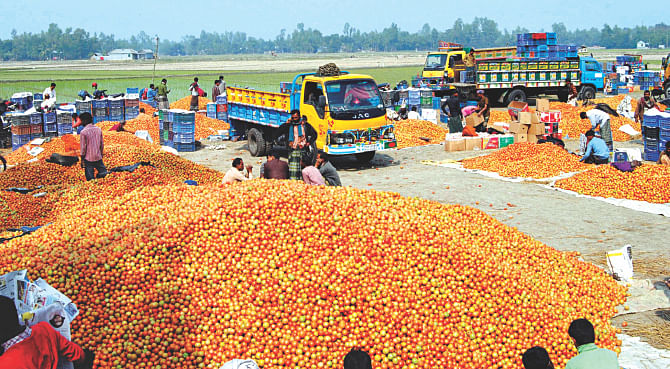Businesses continue to bleed, profusely
Businesses continue to bleed, profusely

The economy is paying a heavy price, thanks to the blockade that continues to disrupt supply chains, corner businesses and threaten government's revenue mobilisation.
The country has lost at least $10 billion directly in physical damages and lost productions, incomes and profits since the BNP-led alliance launched its nonstop blockade on January 6, according to estimates from various chambers and associations.
The blockade and violence have badly hit farm incomes, disrupted inter-district road and rail transport, pushed up food inflation, weakened buyer confidence on the exporters' ability to deliver in time and halted the rebuilding of investors and consumers' confidence.
Every day, the economy is losing about Tk 2,277.86 crore due to the blockade and the strike alone. The amount would stand at Tk 2,500 crore if the daily loss is calculated taking into account the 25 percent of the total industrial production loss, the Dhaka Chamber of Commerce and Industry (DCCI) estimates.
Garment sector, whose contribution accounts for 81 percent of the country's total exports and 15 percent of the GDP, have lost Tk 25,275 crore in the last one month.
During the same period, transport sector counted a loss of Tk 9,000 crore, agriculture 8,643 crore, real estate 7,500 crore and tourism Tk 6,300 crore.
Ports and bridges lost Tk 992.4 crore, ceramics 600 crore, poultry 548.4 crore, plastics 535.5 crore, insurance 450 crore, frozen foods 280 crore, hawkers 450 crore, importers 301.5 crore.
As exports and local sales dipped, the jute sector counted a loss of Tk 500 crore. Factories were forced to cut production by up to 30 percent, according to Bangladesh Jute Mills Association.
The loss in the tanneries stands at Tk 459 crore due to damage of the raw hides and skins, failure to meet exports deadline and bring chemicals from ports and additional transport costs, said the Bangladesh Tanners Association.
Stock markets have also been hit, with the key index on the Dhaka Stock Exchange falling below 4,700-mark for the first time in the last five months. It is because daily turnover dipped to one-month low.
Portfolio investment in the stock market fell 18 percent in January compared to the same month last year as foreign fund managers adopted a “go-slow” strategy.
Small businesses, handlooms and boutiques which are dotted across the country but rely on the capital and other major cities to buy and sell their products have also been counting huge losses.
The country's 25 lakh shops counted Tk 9,000 crore in lost profits, according to Bangladesh Shop Owners Association.
Amid the unabated violence, the government now plans to revise down its 7.3 percent economic growth target for the current fiscal year.
Officials familiar with the finalisation of this year's revised budget and preparing next year's budget expressed concerns over the growth and revenue mobilisation targets.
Food inflation crept up last month bucking the trend of the past seven months, with the disruption in the supply chain causing prices to go up amid rise of wastage at the farm level as well as transport cost.
Remittance, which plays a key role in reducing the overall incidence of poverty in the country as well as helping it maintain a healthy balance of payment, also went down 2.05 percent year-on-year last month.